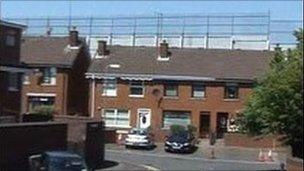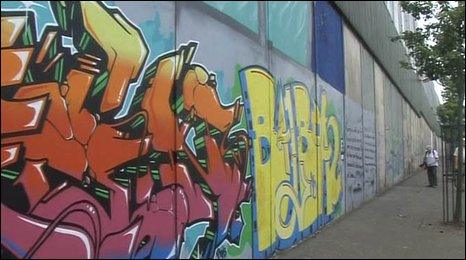Is NI ready for peace walls to be removed?
- Published

The peace line overlooking houses in west Belfast
The issue of whether Northern Ireland's peace walls should be removed is a question which continues to leave people divided.
The country has certainly seen change since the 1998 Good Friday Agreement, but whether it is ready to remove these barriers separating its two main communities is met with uncertainty.
Home to more than 40 so-called peace walls, Belfast's walls still make some people feel safe, but others want more work done on taking them down.
Alliance councillor Tom Ekin once again brought the debate to the forefront by proposing a strategy for their removal at Thursday night's city council meeting.
"The city council, whenever it does something, does it very well and the city council can bring all the parties together - that is the political parties," he said.
'Built out of necessity'
"We can get agreement and then we can get agreement with the people in the areas.
"It is very important that the people who live around the areas of the peace walls buy into this and are confident that they are going to be safe after this and that the area is going to be better after the removal of the barriers."
Mr Ekin was backed by PUP councillor Dr John Kyle.
Speaking on Good Morning Ulster on Friday, Mr Kyle recognised the peace walls had been "built out of necessity" but explained his reasons for lending his support.
"I think people in the areas where the peace walls are would really like to be able to live peacefully together," he said.
"We need to compete with other major cities, so in order to do that we need to have a Belfast that is attractive, cohesive and peaceful and a divided ghettoized society does not attract investment."
He acknowledged that east Belfast had "many excellent relationships between people on the loyalist and the nationalist and republican side".

Graffiti on the Shankill peace line
However, he recognised that it would be "crazy" to take down some peace walls at the moment as it was "simply not the right time".
'Utter dread'
In June, violence erupted at a sectarian interface near a Catholic area in east Belfast.
Petrol bombs, missiles and fireworks were thrown at police lines and shots were fired in the lower Newtownards Road-Short Strand area in trouble reported as the most serious in the area for a decade.
More than 400 people were involved in the disorder which police claimed was orchestrated by the UVF.
The DUP's Gavin Robinson expressed his doubts at Thursday's meeting and addressed the tension still obvious at certain interface areas.
"Even the suggestion of removing those peace walls will fill those residents with utter dread," he said.
"It is the peace walls that provide them with security and peace of mind and even then it doesn't go far enough."
Belfast is not the only place with walls. In total there are 53 Northern Ireland Office maintained peace lines in four towns and cities in the region - 42 in Belfast, five in Londonderry, five in Portadown and one in Lurgan.
For now, the issue has been referred to another committee, so it looks likely that opinion on the dismantling of walls remains as segregated as the communities they separate.